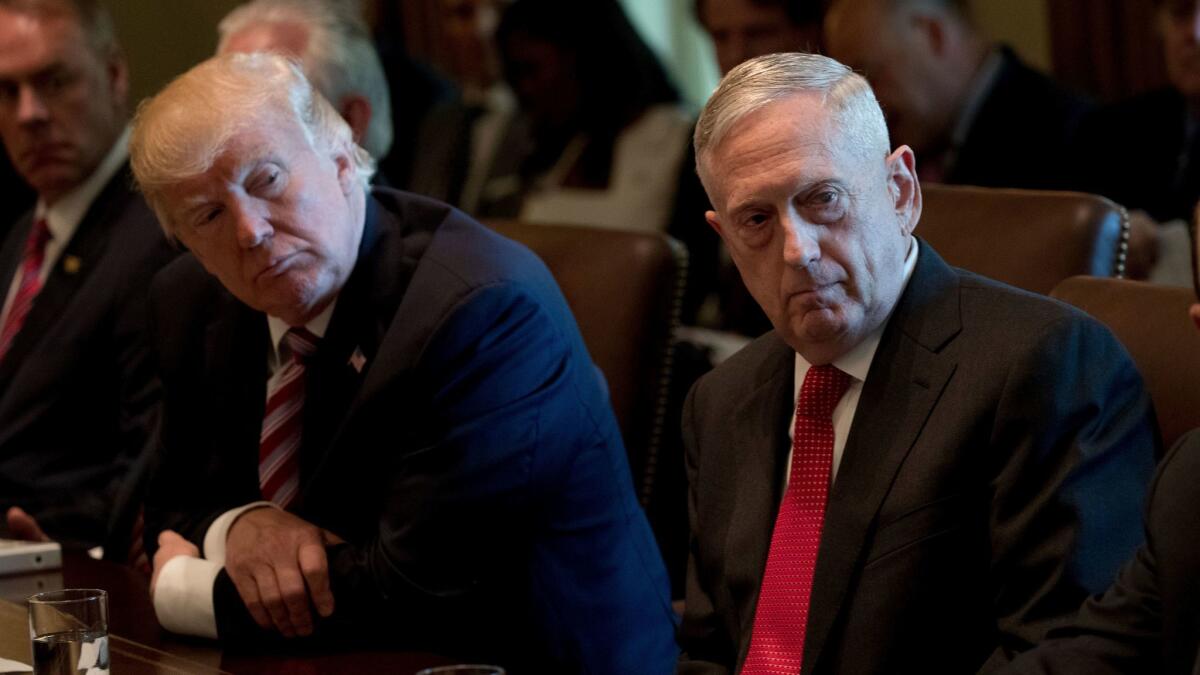Op-Ed: Trump is setting up his generals as fall guys for Afghanistan

- Share via
In David Michôd’s lacerating new movie “War Machine,” Brad Pitt plays Gen. Glen McMahon, the latest in a long line of generals to preside over America’s war in Afghanistan. As he prepares to assume command, McMahon declares his firm intention to “win this thing.”
Wars exist to be won and generals exist to do the winning. McMahon (a thinly fictionalized version of real-life Gen. Stanley McChrystal) fervently adheres to this quaint view. So too, do many ordinary Americans. Faith in generals provides an excuse to avoid thinking seriously about war.
Count President Trump among those who apparently share in that faith. As a business executive (and reality show host), Trump cultivated an image of being unambiguously the guy in charge. Now as commander in chief, he is opting for a more detached approach. When it comes to war, he functions less as full-time CEO than as part-time board chairman.
This represents a sharp departure from established American practice. Ever since President Truman and Gen. Douglas MacArthur butted heads over who should run the Korean War, presidents have played an assertive, at times even intrusive, role in managing military matters. Not Trump, however. Although nominally the boss, Trump appears content to let his generals run things.
The savvy Mattis must suspect that he is the designated fall guy.
For weeks, his administration has been mulling over a request from Gen. John Nicholson, current commander of coalition forces in Afghanistan, to increase the number of U.S. troops committed to that war, which began back when today’s young recruits were still in diapers. To break what he optimistically described as a stalemate, Nicholson was asking for a “few thousand” reinforcements.
Rather than ruling on Nicholson’s request, pending since early February, Trump has passed the buck to the general he has put in charge of the Pentagon, James N. Mattis. Having himself served as senior Marine officer in both Iraq and Afghanistan, Mattis today pretty much owns both of those wars along with lesser ongoing campaigns in Syria, Somalia and Yemen.
That Nicholson will get more troops appears certain — on Friday, the AP reported an addition of 4,000, although the Pentagon said no determination had been made. In any case, Trump is leaving it to Mattis to decide how many and, by extension, to explain why they are needed and how they are to be employed. Thus far, no such explanation has been forthcoming.
On Tuesday, when Mattis appeared before the Senate Armed Services Committee, Sen. John McCain (R-Ariz.) needled him about the absence of a persuasive rationale. “We’re now six months into this administration,” McCain complained. “We still haven’t got a strategy for Afghanistan.”
The Defense secretary’s response was both forthright and evasive. “We are not winning in Afghanistan right now,” he conceded, while promising that “we will correct this as soon as possible.” Mattis then unleashed a cloud of blather, promising “a change in our approach” so as “to do things differently” and devise “a more regional strategy” involving “across-the-board whole of government” collaboration. He offered no specifics.
The fact is that every couple of years since 2001, policymakers in Washington and commanders in the field (including McChrystal) have trotted out plans “to do things differently” in Afghanistan. Those plans have come in a multitude of colors and a variety of sizes. None have come anywhere close to “winning.”
Trump surely knows this. We cannot say for certain why the president has chosen to distance himself from this war that he inherited. But one possibility is this: Having learned through painful experience to recognize a losing proposition, he has no intention of being left holding the bag for this one.
The savvy Mattis must suspect that he is the designated fall guy. If not, he will discover it next year or the year after when Trump relieves himself of responsibility for a still unwon war and looks to pin the blame on someone else.
Until then, in his spare moments, Mattis would be well-served to reflect on the fate of Glen McMahon. The creators of “War Machine” might have called their movie “The Education of a General.” The film serves as a tutorial of sorts, schooling McMahon and with him the rest of us in all that war consists of beyond mere generalship: politics and culture, fear and human frailty, waste and corruption, and not least of all the role of chance, which lately has done our commanders so few favors.
Things end badly for McMahon, who not only fails to “win it,” but also suffers the humiliation of getting himself fired. As the movie ends, another gung-ho general immediately steps up to take his place, of course, so the war machine continues churning without interruption.
Whether Mattis will suffer a similar fate is impossible to say. For now we await the general with the courage to say: “Some wars can’t be won. Afghanistan falls in that category. To persist further is madness.”
Andrew J. Bacevich is the author most recently of “America’s War for the Greater Middle East: A Military History.”
Follow the Opinion section on Twitter @latimesopinionand Facebook
More to Read
A cure for the common opinion
Get thought-provoking perspectives with our weekly newsletter.
You may occasionally receive promotional content from the Los Angeles Times.










